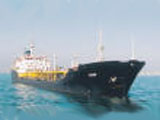|
|
TODAY.AZ / Business
BBC: "First cargo from Caspian pipeline"
26 May 2006 [19:25] - TODAY.AZ

The crude flows 1,768km from the Caspian Sea direct to the Mediterranean for the first time, bypassing Russian pipelines and Turkish straits.
About 300,000 barrels a day will be pumped from the pipeline this year - set to rise to a million barrels daily.
But not all the oil on the tanker comes from the new pipeline, it has emerged.
BP, which has a 30.1% stake in the project, said that while all the crude had come from the Caspian Sea, some had been held in its storage tankers.
The Baku-Ceyhan Campaign, which argued against the pipeline on human rights, social and environmental grounds, said this had been done to try and cover up the delays to the project.
These were "most likely caused by construction failures, inappropriate use of materials and lack of environmental safeguards", it said.
But BP denied the allegations with a spokesman saying it was "perfectly standard practice" to load tankers with oil from pipelines and storage facilities.
Work building the pipeline began 10 years ago and shareholders also include Azeri state oil firm SOCAR, Eni and Total.
The pipe begins near Baku in Azerbaijan and passes through Georgia.
Previously states in the region sent almost all of their oil via Russian pipelines.
The Caspian area produces high-quality light crude but has suffered because of difficulty getting the oil to consumers in Europe, the US, China and Japan.
/www.bbc.co.uk/
URL: http://www.today.az/news/business/26610.html
 Print version
Print version
Connect with us. Get latest news and updates.
See Also
- 25 April 2025 [19:00]
Private sector makes up 83% of GDP, says Deputy Minister - 25 April 2025 [15:39]
Deputy Minister highlights digital economy and Alat Free Economic Zone at Conference - 25 April 2025 [14:55]
Focus on Garabagh and sustainability at upcoming Baku Forum - 25 April 2025 [14:31]
ASCO hosts MEPC 83 Seminar on maritime emissions and sustainability - 24 April 2025 [15:49]
Azerbaijan, ADB discuss development priorities for next four years - 24 April 2025 [12:55]
Azerbaijan achieves major milestones in ICT development, boosts cybersecurity and talent - 24 April 2025 [11:00]
Azerbaijan’s banks shielded from US tariff impact, Fitch reports - 23 April 2025 [18:59]
CBA Governor explains impact of rising interest rates and liquidity on lending and deposits - 23 April 2025 [17:18]
Kazakhstan plans to boost oil exports from Azerbaijan with focus on environmental responsibility - 23 April 2025 [15:27]
Middle Corridor project progresses, Kazakhstan-Azerbaijan cooperation strengthens
Most Popular
 Azerbaijan and China sign mutual visa exemption agreement for ordinary passport holders
Azerbaijan and China sign mutual visa exemption agreement for ordinary passport holders
 Turkiye opens new chapter in space with TÜRKSAT 6A
Turkiye opens new chapter in space with TÜRKSAT 6A
 Khankendi to host 17th Economic Cooperation Organization Summit
Khankendi to host 17th Economic Cooperation Organization Summit
 Armenia's accusations are misinformation, says Azerbaijani Defense Ministry
Armenia's accusations are misinformation, says Azerbaijani Defense Ministry
 Euroashiotics: Metamorphoses of the EU Mission in Armenia
Euroashiotics: Metamorphoses of the EU Mission in Armenia
 First Indonesian Hajj pilgrims to reach Saudi Arabia next week
First Indonesian Hajj pilgrims to reach Saudi Arabia next week
 President Ilham Aliyev visited Monument to the People's Heroes in Beijing
President Ilham Aliyev visited Monument to the People's Heroes in Beijing
